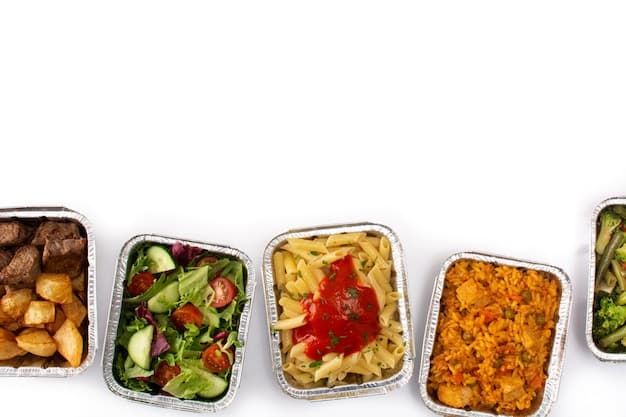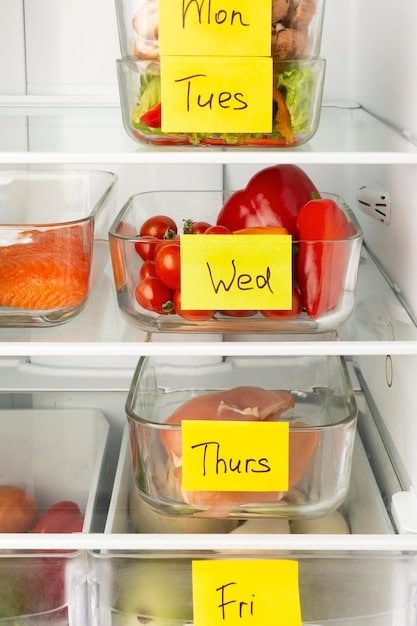Meal Prep Guide: Save Time & Money for a Healthy Week

The Ultimate Guide to Meal Prepping for a Healthy Week: Save Time and Money offers strategies for efficient meal planning, shopping, and cooking to promote a healthier lifestyle while saving valuable time and money.
Are you looking to streamline your week, eat healthier, and save money? The Ultimate Guide to Meal Prepping for a Healthy Week: Save Time and Money offers a practical approach to planning, preparing, and storing your meals, ensuring you have nutritious choices readily available, no matter how busy you are.
Why Meal Prep is a Game Changer for Healthy Living
Meal prepping has emerged as a popular strategy for individuals striving to maintain a healthy lifestyle. It’s more than just a trend; it’s a practical approach that can transform your relationship with food, save you time, and help you achieve your health goals. Let’s delve into why meal prepping is a game changer.
Saves Time Throughout the Week
One of the most significant benefits of meal prepping is the amount of time it saves during the week. Instead of spending precious minutes each day deciding what to eat for lunch or dinner, you’ll have pre-planned, ready-to-go meals.
Promotes Healthier Eating Habits
When you meal prep, you have complete control over the ingredients in your meals. This allows you to make healthier choices, portion your food effectively, and avoid processed foods or unhealthy takeout options.
- Reduces impulse decisions: Having your meals prepped reduces the temptation to grab unhealthy snacks or fast food when you’re hungry and short on time.
- Controls portion sizes: Meal prepping helps you manage your caloric intake by accurately portioning each meal, which is crucial for weight management.
- Increases vegetable intake: Planning your meals in advance makes it easier to incorporate a variety of vegetables and other nutrient-rich foods into your diet.
By taking the time to plan and prepare your meals, you are setting yourself up for a week of healthy choices and balanced nutrition.
Essential Steps to Start Meal Prepping Successfully
Embarking on your meal prepping journey requires a structured approach. These essential steps will guide you to success, making the process efficient and enjoyable. From planning to storing, each step is crucial for maintaining a healthy and organized meal prep routine.

Plan Your Meals
The foundation of successful meal prepping is thoughtful planning. Begin by deciding which meals you want to prep for the week, considering your schedule, dietary preferences, and nutritional needs.
Planning your meals will help you create a shopping list, making grocery shopping more efficient. Consider using a digital meal planning app or a simple notebook to keep track of your meals and ingredient list.
Shop Smartly
With your meal plan in hand, create a detailed shopping list to ensure you buy only what you need. Organize your list by grocery store sections to navigate the store more efficiently.
Consider shopping during off-peak hours to avoid crowds and reduce stress. Opt for in-season produce to save money and enjoy the freshest flavors.
- Check your pantry: Before heading to the store, take inventory of what you already have to avoid duplicate purchases.
- Buy in bulk: Purchase commonly used staples like grains, nuts, and seeds in bulk to save money in the long run.
- Read labels carefully: Pay attention to nutrition labels and ingredient lists to make informed choices.
Smart shopping not only saves money but also ensures you have all the necessary ingredients to prepare your healthy meals.
Choosing the Right Containers and Storage Methods
Selecting the appropriate containers and storage methods is paramount to maintaining the freshness and quality of your prepped meals. The right choice can extend the shelf life of your food and make it easier to grab and go.
Container Options
The market offers a plethora of container options, each with its unique advantages. Consider your needs and preferences when selecting containers for your meal prep.
Glass containers are an excellent option for those concerned about chemicals leaching into their food. They are also durable and easy to clean.
Safe Storage Practices
Proper storage techniques are crucial for preserving the quality and safety of your prepped meals. Follow these guidelines to ensure your food stays fresh throughout the week.
- Cool food quickly: Allow your cooked food to cool to room temperature before refrigerating or freezing it.
- Use airtight containers: Ensure your containers are airtight to prevent freezer burn and keep food fresh.
- Label and date your containers: Keep track of when you prepped each meal to ensure you consume it within a safe timeframe.
Investing in high-quality containers and following safe storage practices will help you maintain the freshness and nutritional value of your prepped meals.

Delicious and Nutritious Meal Prep Recipes
One of the most exciting aspects of meal prepping is the opportunity to explore diverse and flavorful recipes. Incorporating a variety of ingredients and culinary styles can keep your meals interesting and prevent boredom.
Breakfast Ideas
Starting your day with a nutritious breakfast sets the tone for a healthy and productive day. Here are some quick and easy breakfast meal prep ideas.
Overnight oats are a convenient option that can be prepared in advance and customized with various toppings such as fruits, nuts, and seeds.
Lunch and Dinner Options
Lunches and dinners are prime candidates for meal prepping, allowing you to maintain a balanced diet even on the busiest days. Consider these delicious and nutritious options.
- Quinoa bowls: Combine cooked quinoa with roasted vegetables, grilled chicken or tofu, and a flavorful dressing for a filling and nutritious lunch.
- Chicken stir-fry: Prepare a large batch of stir-fried chicken with mixed vegetables and brown rice for a balanced and satisfying dinner.
- Lentil soup: Make a hearty lentil soup with vegetables and herbs for a warm and comforting meal.
By incorporating these delicious and nutritious recipes into your meal prep routine, you can enjoy a diverse and satisfying diet throughout the week.
Common Meal Prep Mistakes and How to Avoid Them
Even with careful planning, common mistakes can derail your meal prep efforts. Awareness of these pitfalls and strategies to avoid them can help you stay on track and enjoy the full benefits of meal prepping.
Overcomplicating Recipes
One of the most common mistakes is choosing overly complicated recipes that require a lot of time and effort. Start with simple meals and gradually increase the complexity as you become more comfortable with the process.
Opt for recipes with fewer ingredients and straightforward instructions. Look for dishes that can be easily adapted to suit your preferences and dietary needs.
Ignoring Food Safety Guidelines
Neglecting food safety guidelines can lead to foodborne illnesses and negate the health benefits of meal prepping. Always prioritize food safety when preparing and storing your meals.
- Wash produce thoroughly: Rinse fruits and vegetables under running water to remove dirt and bacteria.
- Cook food to safe temperatures: Use a food thermometer to ensure meats, poultry, and seafood are cooked to their recommended internal temperatures.
- Store food properly: Refrigerate perishable foods within two hours to prevent bacterial growth.
By avoiding these common meal prep mistakes, you can ensure a safe, efficient, and enjoyable meal prepping experience.
Staying Motivated and Consistent with Your Meal Prep Routine
Consistency is key to reaping the long-term benefits of meal prepping. However, maintaining motivation can be challenging. Here are some strategies to stay inspired and consistent with your meal prep routine.
Set Realistic Goals
Start with small, achievable goals to avoid feeling overwhelmed. Commit to prepping just a few meals per week and gradually increase the number as you become more comfortable.
Celebrate your successes and acknowledge your progress. Reward yourself for reaching milestones to stay motivated.
Find an Accountability Partner
Enlist a friend, family member, or colleague to join you on your meal prepping journey. An accountability partner can provide support and encouragement, helping you stay on track.
- Share recipes and tips: Exchange meal prep ideas and strategies with your partner to keep things interesting.
- Check in regularly: Schedule regular check-ins to discuss your progress and challenges.
- Celebrate milestones together: Recognize and celebrate each other’s achievements to boost morale.
By implementing these strategies, you can cultivate a sustainable and enjoyable meal prepping routine that supports your health and well-being.
| Key Point | Brief Description |
|---|---|
| ⏰ Time Savings | Meal prepping reduces daily cooking time, freeing up your schedule. |
| 💰 Cost-Effective | Planning meals minimizes waste and reduces impulse food purchases. |
| 🥗 Healthier Choices | Control ingredients and portion sizes, promoting a balanced diet. |
| 🍎 Portion Control | Easily manage your caloric intake ensuring the proper portion sizes are followed. |
FAQ
▼
Most prepped meals can safely last in the refrigerator for up to four days. Ensure the food is stored in airtight containers to maintain freshness and prevent bacterial growth. Labeling each container with the prep date is also a good practice.
▼
Yes, freezing prepped meals is a great way to extend their shelf life. Properly frozen meals can last for up to two to three months. Use freezer-safe containers or bags and thaw completely before reheating and consuming.
▼
Glass and BPA-free plastic containers are excellent choices. Glass containers are durable, easy to clean, and don’t leach chemicals. BPA-free plastic containers are lightweight and affordable. Opt for containers with airtight seals to maintain food freshness.
▼
Variety is key to preventing meal prep boredom. Incorporate different recipes, ingredients, and flavors each week. Explore new cuisines, experiment with spices, and use a variety of cooking methods to keep your meals exciting and enjoyable.
▼
Yes, you can prep all your meals for the week, but be mindful of food safety. Prioritize recipes that store well and consume meals prepared earlier in the week first. Proper storage and temperature control are essential when prepping meals for the entire week.
Conclusion
Incorporating meal prepping into your routine offers a practical and sustainable approach to healthy eating, saving time, and managing your budget. By following these guidelines, you can transform your relationship with food, achieve your health goals, and enjoy the numerous benefits of a well-planned and executed meal prep routine.





